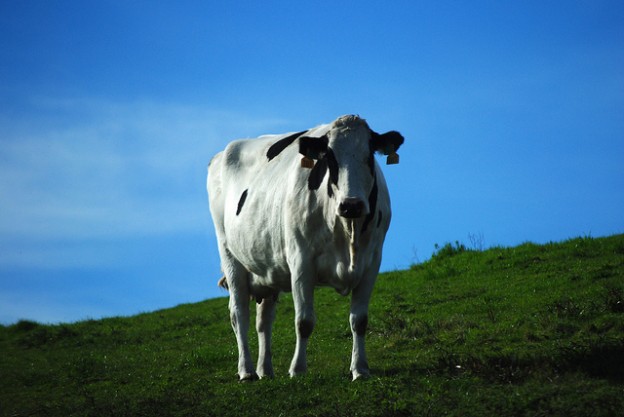
Photo: LisaW124/Flickr
Last Friday, we told you about the new and controversial deregulation of pesticide-resistent alfalfa, which some farmers worry could raise the price of their crops, dairy and livestock. We asked local farmers to tell us their thoughts on these genetically modified organisms (GMOs) – and how the new rules could affect them. Here is what two had to say.
Mary Moran, High Ridge Meadows Farm, Vermont:
Wow! I can’t begin to explain how potentially dangerous I think GMOs are. The onus should be on GMO seed companies as far as I can see. They put their products into the stream of commerce knowing that it has the potential to cross-pollinate and naturally become airborne, which is trespassing upon the organic farmer… If that happens, we (organic farmers) run the danger of losing our certification. The organic farmer (especially those with large alfalfa, grain, corn, whatever crops) are in danger of lawsuits for patent infringement. It’s a crock of bologna! We do not grow alfalfa, however we do feed it to our sheep and cattle in pellet form. It’s not just alfalfa, it’s all GMO seeds we should worry about. The practice of producing GMO seed is inherently dangerous and is opening up a Pandora’s box that someday we will want to close and be unable to. We are futzing with nature and the outcome promises to be unpleasant at least.
Larry Savage, Green Ledge Farm, New Hampshire:
We do not use alfalfa in our beef cattle operation so there is little impact on us directly. Alfalfa is used extensively in dairy operations and there would be more impact there. The most impact would be on organic alfalfa seed producers. The problem is that alfalfa is pollinated by bees. A producer of organic seed would need to make sure that bees that had visited a nearby field with GMO alfalfa could not cross-pollinate with their crop. Organic alfalfa seed production would be impossible in an area where Round Up Ready alfalfa was planted. The risks to the organic seed industry have been largely ignored by the USDA.
Organic beef and dairy producers will need to make sure that their purchased feeds are not contaminated by GMO alfalfa. Producers of organic alfalfa forage will need to make sure that their seedstocks are certified organic and free of GMOs like they do now. However, seed producers will never be able to be certain that their seed stock (or some portion of it) isn’t contaminated with GMO genes from contaminated bee pollen.
***
Ok, readers: your turn. What do you think about this? Have you been following the issue?

Pingback: Tweets that mention Are GMOs dangerous? Farmers speak out | Public Radio Kitchen | Blogs | WBUR -- Topsy.com
I do not want to drink milk from dairy cows who ate genetically engineered food, or use products containing GE alfalfa thru the milk content.
I do not want bees contaminating any organic fields and who knows about the honey that they make. And, how will the bees survive after eating contaminated pollen?
Genetically engineered alfalfa, nor any other crop, is acceptable.
Monsanto and other GE companies want to rule the world of food, even if it kills us.
Thanks for letting me voice my concerns
MyraSaidIt
http://myrasaidit.blogspot.com/
GMOs, pesticides, herbicides